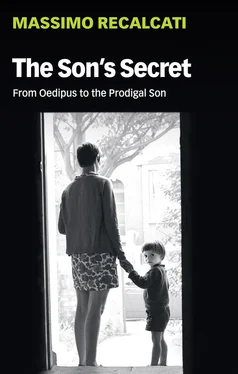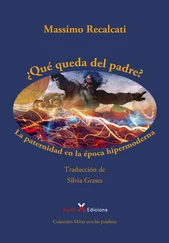1 Cover
2 Front Matter The Son’s Secret From Oedipus to the Prodigal Son Massimo Recalcati Translated by Alice Kilgarriff polity
3 Introduction Notes
4 Part One 1 Oedipus: The Son of Guilt The Child’s Condition The Word and Language The Slave-Messenger Oedipus, The Son The Innocent-Guilty Infanticide Violence Without Law A Tragedy of Light Nemesis ‘You Are the Curse, the Corruption of this Land’ Oedipus and Hamlet Descending into the Grave How Much Truth Can One Man Bear? Notes
5 Part Two 2 The Prodigal Son The Rain Another Son to Bend the Law of Destiny The Parable of the Prodigal Son ‘Give Me My Share of the Estate!’ A Bad Interpretation of the Law Isaac the Son The Father’s Gift and the Celebration of Rediscovery The Son’s Return The Chance For a New Life Rembrandt’s Portrait The Rightful Son Freud on the Acropolis The Resurrection of Life The Scar that Becomes a Poem Notes
6 Epilogue
7 End User License Agreement
1 Cover
2 Table of Contents
3 Begin Reading
1 ii
2 iii
3 iv
4 1
5 2
6 3
7 4
8 5
9 6
10 7
11 9
12 10
13 11
14 12
15 13
16 14
17 15
18 16
19 17
20 18
21 19
22 20
23 21
24 22
25 23
26 24
27 25
28 26
29 27
30 28
31 29
32 30
33 31
34 32
35 33
36 34
37 35
38 36
39 37
40 38
41 39
42 40
43 41
44 42
45 43
46 45
47 46
48 47
49 48
50 49
51 50
52 51
53 52
54 53
55 54
56 55
57 56
58 57
59 58
60 59
61 60
62 61
63 62
64 63
65 64
66 65
67 66
68 67
69 68
70 69
71 70
72 71
73 72
74 73
75 74
76 75
77 76
78 77
79 78
80 79
81 80
82 81
83 82
84 83
85 84
86 85
87 86
88 87
89 88
90 89
91 102
For my son Tommaso, for his life .
Why do you look for the living among the dead? He is not here; he is risen!
Luke 24:5–6
The Son’s Secret
From Oedipus to the Prodigal Son
Massimo Recalcati
Translated by Alice Kilgarriff
polity
Copyright © Giangiacomo Feltrinelli Editore Milano. First published in 2017 in Italian under the title Il Segreto del Figlio . Published under licence from Giangiacomo Feltrinelli Editore, Milan, Italy. This English edition © Polity Press, 2020
Polity Press
65 Bridge Street
Cambridge CB2 1UR, UK
Polity Press
101 Station Landing
Suite 300
Medford, MA 02155, USA
All rights reserved. Except for the quotation of short passages for the purpose of criticism and review, no part of this publication may be reproduced, stored in a retrieval system or transmitted, in any form or by any means, electronic, mechanical, photocopying, recording or otherwise, without the prior permission of the publisher.
ISBN-13: 978-1-5095-3178-3
A catalogue record for this book is available from the British Library.
Library of Congress Cataloging-in-Publication Data
Names: Recalcati, Massimo, author.
Title: The son’s secret : from Oedipus to the prodigal son / Massimo Recalcati ; translated by Alice Kilgarriff.
Other titles: Segreto del Figlio. English
Description: Cambridge, UK ; Medford, MA : Polity, [2020] | “First published in 2017 in Italian under the title Il Secreto [sic] del Figlio.” | Includes bibliographical references. | Summary: “This new book by Massimo Recalcati focuses on the psycho-social life of the son”-- Provided by publisher.
Identifiers: LCCN 2019035308 (print) | LCCN 2019035309 (ebook) | ISBN 9781509531752 (hardback) | ISBN 9781509531769 (paperback) | ISBN 9781509531783 (epub)
Subjects: LCSH: Parent and child--Psychological aspects. | Sons--Psychology. | Oedipus complex. | Prodigal son (Parable) Classification: LCC BF723.P25 R43313 2020 (print) |
LCC BF723.P25 (ebook) | DDC 155.9/24--dc23
LC record available at https://lccn.loc.gov/2019035308LC ebook record available at https://lccn.loc.gov/2019035309
The publisher has used its best endeavours to ensure that the URLs for external websites referred to in this book are correct and active at the time of going to press. However, the publisher has no responsibility for the websites and can make no guarantee that a site will remain live or that the content is or will remain appropriate.
Every effort has been made to trace all copyright holders, but if any have been overlooked the publisher will be pleased to include any necessary credits in any subsequent reprint or edition.
For further information on Polity, visit our website: politybooks.com
The need for dialogue between children and their parents as a fundamental part of children’s upbringing is insisted upon today in a variety of ways. Faced with the slow yet traumatic erosion of paternal authority that has seen the dissolution of the father-as-master, this dialogue seems to have rightly replaced the brutal commands, loud voice and stern looks that had previously characterized the all-too-familiar face of the father-as-master. There has been an epochal shift. Fathers and sons find themselves in a state of proximity that, until a short time ago, was entirely unheard of. Fathers are no longer the symbol of the Law. Now, like mothers, they too occupy themselves with the bodies, free time and emotions of their children. This proximity – an effect of the rightful weakening of paternal authority – can no doubt be welcomed as the positive emancipation of the educational discourse from excessively rigid, normative precepts.
Never before has such careful attention been paid to the relationship between parents and their children. The son is increasingly presented as a prince to whom the family offers its myriad services. The risk here is that this newfound attention justifies an alteration in the symbolic difference that distinguishes children from their parents, with children demanding the same symbolic dignity as their parents, the same rights, the same opportunities. 1This new proximity characterizing the bond between parents and their children paves the way for a closeness among equals, or, worse, a sort of confused identification that springs from the horizontalization of bonding, causing it to lose any sense of verticality. The pedagogical rhetoric of dialogue, which today is king, is in my opinion a macroscopic effect of this confusion.
The same can be said of the word ‘empathy’, now hegemonic and central to all psycho-pedagogical reasoning. A basic supposition – that speaking to our children means understanding them, seeing ourselves in them, sharing their joy and their suffering, essentially living their lives – sustains its inflated use. Who today would be brave enough to object to this positive empathy- and dialogue-based representation of the family’s educational bond? Is this not the politically correct model that must be supported and widely disseminated? And who, furthermore, would ever dream of denying the importance of dialogue and empathetic understanding in the relationship between parents and their children?
In this book, by revisiting two famous sons – Sophocles’ Oedipus and the prodigal son from the parable in Luke’s Gospel – and their complex relationships with their respective fathers, I aim to problematize this outcome of the hypermodern educational discourse in a critical manner, attempting to indicate a different path. Not that of the often rhetorical valorization of dialogue and empathy, but that of recognizing that a child’s life is, above all, another life: a life that is foreign, distinct, different – that it exists within the limit zone and is impossible to comprehend. Is a child not the greatest mystery, one that defies all attempts at interpretation? Is a child not precisely a point of difference, of resistance, of the uncontainable insurgence of life? Is this not their beauty, which is both radiant and threatening? Is the child’s life not an indecipherable secret that must be respected as such?
Читать дальше












